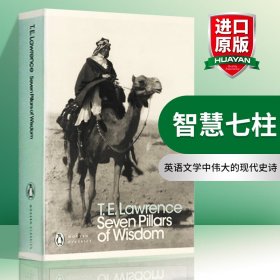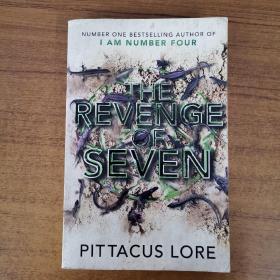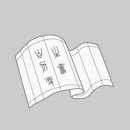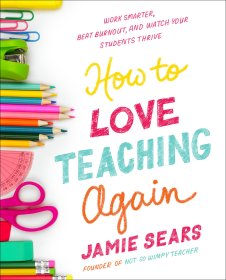
英文原版 Seven Pillars of Wisdom: A Triumph智慧七柱 英文版 进口英语原版书籍
书籍内容简介可联系客服查阅,查书找书开票同样可以联系客服
¥ 55 ¥ 55 九五品
库存14件
作者Lawrence, T.E.
出版社Penguin Classics
ISBN9780141182766
出版时间2000-03
装帧平装
定价55元
货号YB-2698
上书时间2024-03-13
- 最新上架
商品详情
- 品相描述:九五品
- 商品描述
-
内容摘要
优惠促销活动日期:2019-04-29 18:07:00 - 2019-05-12 18:07:00 单笔订单满2件 减1元 单笔订单满3件 减3元 书名:Seven Pillars of Wisdom智慧七柱 作者:T.E. Lawrence 出版社名称:Penguin Classics 出版时间:2000 语种:英文 ISBN:9780141182766 商品尺寸:12.9 x 3.2 x 19.7 cm 包装:平装 页数:704 ★奥斯卡史诗电影《阿拉伯的劳伦斯》原著 ★一部供世人回味的奇书,一段沙漠战争回忆 ★它是战史的经典,更是冒险与旅行的不朽经典 ★“他们也知道,置身于沙漠中,注定要与一个敌人做永无止境的抗争,这个敌人不是这个世间,不是人生,什么都不是,而是希望。” T.E.劳伦斯是英国著名的军官和外交官,他改变了整个阿拉伯半岛的历史,被认为是史上伟大的军事将领之一,与拿破仑、隆美尔等人并列。他能写出文采绝伦、充满诗人情怀的书,也能翻译荷马的古希腊史诗。Seven Pillars of Wisdom《智慧七柱》讲述了一场“劳伦斯式”聪明的战争,他运用战史上耗费代价较小、收效较大的游击战略赢得了胜利。 本书为英文版,包含由Eric Kennington绘制的地图、地名索引和A.W. Lawrence写的序言。 精彩书评: 这是一部举世杰作:世间少有可与之匹敌的同类作品。──萧伯纳 此书跻身于英语文学伟大的著作,且在战争与冒险的描述上,无人能超过。──丘吉尔 我不太算是个英雄崇拜者,但我愿意追随劳伦斯直至天涯海角。 ──苏格兰小说家约翰·巴肯 我们可以说,劳伦斯一个人承受了整个世代的神经质病痛。──美籍英国作家伊舍伍德 Seven Pillars of Wisdom is the autobiographical account of T.E. Lawrence - also known as 'Lawrence of Arabia' - of his service in the Arab Revolt during the First World War, published in Penguin Modern Classics. Although 'continually and bitterly ashamed' that the Arabs had risen in revolt against the Turks as a result of fraudulent British promises of self-rule, Lawrence led them in a triumphant campaign which revolutionized the art of war. Seven Pillars of Wisdom recreates epic events with extraordinary vividness. In the words of E. M. Forster, 'Round this tent-pole of a military chronicle, Lawrence has hung an unexampled fabric of portraits, descriptions, philosophies, emotions, adventures, dreams'. However flawed, T.E. Lawrence is one of the twentieth century's most fascinating figures. This is the greatest monument to his character and achievements, and formed the basis for the Oscar-winning film Lawrence of Arabia, staring Peter O'Toole and Alec Guinness. This edition includes maps, drawings by Eric Kennington, and index of place names and a preface by A.W. Lawrence. Review 'I am not much of a hero-worshipper, but I could have followed T.E. Lawrence over the edge of the world'--John Buchan, author of The Thirty-Nine Steps Seven Pillars of Wisdom《智慧七柱》记录了T. E.劳伦斯在沙漠中的战争回忆,被公认为“英语文学中伟大的现代史诗”。第1次世界大战爆发后,劳伦斯毅然放弃考古工作,进入开罗军事情报部,负责中东地区的情报收集及战略建议。当时英军认为,以承诺让阿拉伯人在战后独立为名,使阿拉伯建国主义者与英国站在同一阵线,由内陆起兵反抗统治他们多年的奥斯曼土耳其帝国,将有助于协约国在中东地区取得压倒性胜利。劳伦斯在因缘际会于1916年底成为阿拉伯起义运动领袖之一费萨尔阵营中的英军联络官,也成为巴勒斯坦战役的决定性人物。自此至1918年,劳伦斯巧用机谋,在阿拉伯部落间引燃独立建国的燎原之火,善用阿拉伯部落擅长的游击战略,以及阿拉伯沙漠漫无边际、变化难测的特性,率领三千阿拉伯起义军,神出鬼没,专事破坏土耳其的补给铁路,牵制了五万以上的土耳其正规部队,创下历史上代价较小而获利巨大的战果。 Although 'continually and bitterly ashamed' that the Arabs had risen in revolt against the Turks as a result of fraudulent British promises of self-rule, Lawrence led them in a triumphant campaign which revolutionized the art of war. "Seven Pillars of Wisdom" recreates epic events with extraordinary vividness. In the words of E. M. Forster, 'Round this tent-pole of a military chronicle, T. E. has hung an unexampled fabric of portraits, descriptions, philosophies, emotions, adventures, dreams'. However flawed, Lawrence is one of the twentieth century's most fascinating figures. This is the greatest monument to his character and achievements. T. E.劳伦斯(1888-1935),英国军官、外交官。1910年至1914年间,担任大英博物馆在幼发拉底河畔的卡赫美士考古队的助理。第1次世界大战爆发后投笔从戎,先在伦敦的参谋总部地理部门工作,后奉派至开罗的情报部门。1916年,阿拉伯建国主义者起身反抗奥斯曼土耳其帝国,劳伦斯前往麦加收集情报,后在形势推动下成为阿拉伯起义团体的英军联络官。1919年,成为英国参与巴黎和会的代表团成员,致力于推进阿拉伯独立。1921年担任英国殖民部中东署阿拉伯事务顾问,次年辞去该职务,加入英国皇家空军,担任地勤技师。在军事上,他是巴勒斯坦战役的决定性人物,当代战略专家贝文?亚历山大把他和拿破仑、隆美尔等人并列,认为他是史上伟大的军事将领之一,对游击战的理论发明贡献尤多。劳伦斯的著作还有散文体译作《荷马的奥德赛》和《十字军城堡》、《铸造厂》等。 Thomas Edward Lawrence (16 August 1888 – 19 May 1935) was a British author, archaeologist, military officer, and diplomat. He was renowned for his liaison role during the Sinai and Palestine Campaign and the Arab Revolt against the Ottoman Empire during the First World War. The breadth and variety of his activities and associations, and his ability to describe them vividly in writing, earned him international fame as Lawrence of Arabia. Some of the evil of my tale may have been inherent in our circumstances. For years we lived anyhow with one another in the naked desert, under the indifferent heaven. By day the hot sun fermented us; and we were dizzied by the beating wind. At night we were stained by dew, and shamed into pettiness by the innumerable silences of stars. We were a self-centred army without parade or gesture, devoted to freedom, the second of man’s creeds, a purpose so ravenous that it devoured all our strength, a hope so transcendent that our earlier ambitions faded in its glare. As time went by our need to fight for the ideal increased to an unquestioning possession, riding with spur and rein over our doubts. Willy-nilly it became a faith. We had sold ourselves into its slavery, manacled ourselves together in its chain-gang, bowed ourselves to serve its holiness with all our good and ill content. The mentality of ordinary human slaves is terrible — they have lost the world — and we had surrendered, not body alone, but soul to the overmastering greed of victory. By our own act we were drained of morality, of volition, of responsibility, like dead leaves in the wind. The everlasting battle stripped from us care of our own lives or of others’. We had ropes about our necks, and on our heads prices which showed that the enemy intended hideous tortures for us if we were caught. Each day some of us passed; and the living knew themselves just sentient puppets on God’s stage: indeed, our taskmaster was merciless, merciless, so long as our bruised feet could stagger forward on the road. The weak envied those tired enough to die; for success looked so remote, and failure a near and certain, if sharp, release from toil. We lived always in the stretch or sag of nerves, either on the crest or in the trough of waves of feeling. This impotency was bitter to us, and made us live only for the seen horizon, reckless what spite we inflicted or endured, since physical sensation showed itself meanly transient. Gusts of cruelty, perversions, lusts ran lightly over the surface without troubling us; for the moral laws which had seemed to hedge about these silly accidents must be yet fainter words. We had learned that there were pangs too sharp, griefs too deep, ecstasies too high for our finite selves to register. When emotion reached this pitch the mind choked; and memory went white till the circumstances were humdrum once more. Such exaltation of thought, while it let adrift the spirit, and gave it licence in strange airs, lost it the old patient rule over the body. The body was too coarse to feel the utmost of our sorrows and of our joys. Therefore, we abandoned it as rubbish: we left it below us to march forward, a breathing simulacrum, on its own unaided level, subject to influences from which in normal times our instincts would have shrunk. The men were young and sturdy; and hot flesh and blood unconsciously claimed a right in them and tormented their bellies with strange longings. Our privations and dangers fanned this virile heat, in a climate as racking as can be conceived. We had no shut places to be alone in, no thick clothes to hide our nature. Man in all things lived candidly with man. 1234567
相关推荐
-

SEVEN【英文原版】
八五品衡水
¥ 180.00
-

SEVEN UP(英文原版)
八五品北京
¥ 30.00
-

Seven Up【英文原版】
八五品广州
¥ 56.00
-

SEVEN BRIDES IRIS(英文原版)
八五品北京
¥ 30.00
-

SEVEN BRIDES Rose(英文原版)
八五品北京
¥ 40.00
-

THE SEVEN CSOFCONSULTING英文原版
八五品深圳
¥ 180.00
-

Seven Black Stones【英文原版】
九品广州
¥ 45.00
-

The Galileo Seven【英文原版】
九五品广州
¥ 32.00
-

英文原版 THE REVENGE OF SEVEN
九品商丘
¥ 28.20
-

SEVEN DAYS TO PEROGRAD(英文原版)
八五品天津
¥ 20.00
— 没有更多了 —













以下为对购买帮助不大的评价